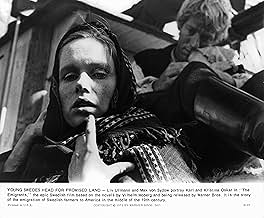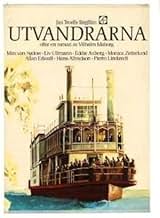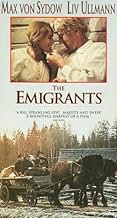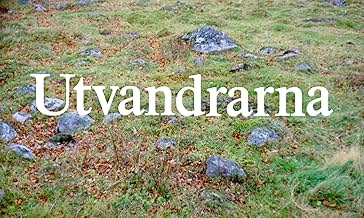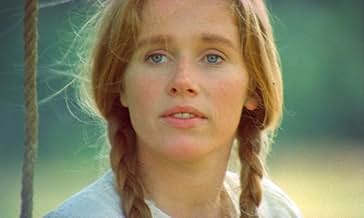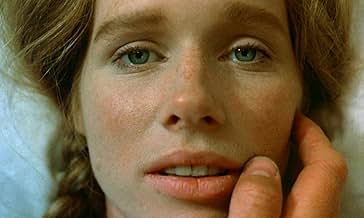Aggiungi una trama nella tua linguaAn 1840s Swedish farming family struggle with their unyielding land and decide to embark on the arduous journey to new hope in America.An 1840s Swedish farming family struggle with their unyielding land and decide to embark on the arduous journey to new hope in America.An 1840s Swedish farming family struggle with their unyielding land and decide to embark on the arduous journey to new hope in America.
- Regia
- Sceneggiatura
- Star
- Candidato a 5 Oscar
- 8 vittorie e 11 candidature totali
- Nils
- (as Svenolof Bern)
Recensioni in evidenza
I was trying to explain one of the most unique things about the film (and its 2nd part, The New Land) to my brother but I was having a hard time finding the words. Finally, "transfixed" was what I was looking for. The film is long but it held me "transfixed" with nearly every scene. The shots are long. The dialog is often sparse. The soundtrack is almost non-existent. Rather, the director holds one nearly spellbound by "showing" rather "telling" the story. The imagery and expressions on the actors' faces and their silent actions relate most of what makes this film so powerful.
As the viewer, you feel almost like you are right there with the characters, sharing the moments along side them. One becomes immersed in what is happening as if you are there. The powerful empathy that the film manages to generate within the viewer is really quite amazing given the lack (or maybe due to the lack) of modern cinematic styles and techniques.
Another thing about this film that is incredibly impressive is that the viewer really gets a sense of how someone migrating from Sweden at the time would see things and think. The perspective is fresh and unapologetically authentic. Unlike many films set in the past, it does not "dumb-down" any aspect by modernizing or "updating" anything to make it easier for a modern audience to relate to (language, mannerisms, music, etc.). One of my biggest peeves about modern films set in the past is that, other than the wardrobe, everything else is modern... modern language, modern manners, modern politics/norms, modern music (electric guitar in the soundtrack of a "western" film?). It is also refreshingly unpolluted by modern-day political correctness.
This is really a fantastic work of art that in many ways, gets better with time as it is so accurate and truthful to the situation and period. The 2nd part, "The New Land" is equally as fantastic. It is not a "sequel" per se, but rather the filmmaker realized he would need several hours to accurately portray the story set out in the book and one movie would be too long. So, it was essentially shot as one long movie but released in two parts in back-to-back years.
This film really provides the viewer with an authentic sense of the times and the situations many emigrants went through in the mid-19th century. One of the best film discoveries I've made in a long time. Highly recommended.
As a historical document 'The Emigrants' is a great film. It shows us a moment of crisis in the history of Sweden and Europe, one of those periods that produced the great human migrations to America in the 19th century. From the point of view of American history it is a film about the Zero Moment of the American dream. There is, of course, a lot of naivety in the image that future immigrants have about the New World. Even the most educated of them owe their knowledge of reading propaganda books, written in order to encourage emigration, which contained many inaccuracies, intentional or not. But precisely this naivety is one of the pillars of the American dream. The road is littered with obstacles and not everyone who starts it reaches the promised shore. The power and quality of the film also lies in the description of the psychology and motivation of those who leave their country and the places where they were born and lived forever to embark on an adventure that seems exceptional today. And again, we cannot help but compare what we see in the film with the psychology and motivations of many of today's migrants.
The extremely thorough reconstruction of life in 19th-century Swedish villages contributes to the authenticity and credibility of what we see on screen. The film has an exceptional distribution with Max von Sydow and Liv Ullmann in the lead roles. With its over three hours 'The Emigrants' has a format and duration that can be a test for today's viewers. Those who will respond to the challenge will enjoy a quality film show about an episode of history that resonates in the present.
Few of the characters believe the streets of America are paved with gold. Instead, The Emigrants is a brutally realistic take about struggling and seeing no future in one's homeland and deciding to risk everything in order to have a shot at a better future. The movie is neither cliche nor cynical about the "American Dream." It makes its social points through contrasts and juxtaposition. We see the wealthy Americans aboard a steamboat interspersed with jarring shots of chained slaves below. There also are incredible moments of wonder, like the elderly Swedish woman seeing a steam engine approach for the first time in her life.
The film is an honest and moving portrait about one group of Swedish expats seeking opportunity, whether financial or religious. Perhaps most of all, the movie captures the sense of home and of homelessness for the characters. The chemistry between von Sydow and Ullmann is incredible. Husband and wife, they say they are best friends, and it shows. It's powerful acting.
I would give this film a 9/10, but for the editing. At least a half hour of this film could have been left on the cutting-room floor, particularly in the first half. You could walk away for several minutes and miss nothing. Otherwise, The Emigrants definitely worth seeing.
The first part of the film details the challenges these people face that make them want to emigrate in the first place. An oppressive village hierarchy in which all laws and rules of accepted behavior are arbitrated by a self-appointed few, as well as conditions that make farming a constant struggle, leave them craving the freedoms and fertility of the mythic U.S. The second part of the film is a meticulous recreation of what the actual journey was like, including a long segment about the miseries of crossing the Atlantic Ocean (including sea sickness and lice), and the interminable trek up the Mississippi River to Minnesota once they landed. It's almost impossible to wrap your head around how frightening this entire experience would have been for them. These people knew almost nothing about the world outside of their small Swedish village (one young man doesn't even know how the ocean works and thinks they're all going to drown if the water rises) and trust themselves to strangers who don't speak their language or really have any reason to look out for their interests. It's a fascinating film and feels more like a documentary than a fictional narrative.
Unfortunately, the only version I was able to see was the dubbed one shown by TCM. I would have much preferred to see it subtitled so that I could experience von Sydow's and Ullmann's performances as they were meant to be experienced.
"The Emigrants" was nominated for Best Foreign Language Film at the 1971 Academy Awards, and then because of Oscar's weird eligibility rules popped up again a year later with four nominations, for Best Picture, Best Director (Jan Troell), Best Actress (Ullmann), and Best Adapted Screenplay. At the time, it was only the third foreign language film after "Grand Illusion" and "Z" to receive a Best Picture nomination. And the film's sequel, "The New Land," was up for Best Foreign Language Film the same year that "The Emigrants" was in the Best Picture race. Good couple of years for director Jan Troell.
Grade: A
Lo sapevi?
- QuizWhen filming the scene towards the end, where Karl Oskar walks off to find a better place for his settlement, director Jan Troell forgot to yell, "Cut." Max von Sydow just kept walking and walking, waiting for a "cut", and nobody realized until they took lunch.
- BlooperOn the train west a character shows an American silver coin and yells out it has "In God We Trust" on it. The scene is the 1850s and the motto was not added to American silver coins until 1867.
- Citazioni
Arvid: What do you think it will cost to ship us there?
Robert: Around 200 riksdaler.
Arvid: Ya, well, might as well forget it. 200 riksdaler. I'll never have that much.
Robert: You don't have it?
Arvid: I will go anyway. We can travel to America on foot.
Robert: Nah, there's an ocean. You can't go on foot to America.
Arvid: Do you mean there is no way?
Robert: I'm afraid there is not. America is an island.
Arvid: Damned ocean.
- Versioni alternativeThe USA television version, retitled "The Emigrant Saga", consists of this film plus its sequel, La nuova terra (1972), joined and re-edited together in chronological order and dubbed in English.
- ConnessioniEdited into Spisok korabley (2008)
I più visti
- How long is The Emigrants?Powered by Alexa
Dettagli
Botteghino
- Lordo Stati Uniti e Canada
- 1.156.554 USD
Contribuisci a questa pagina


